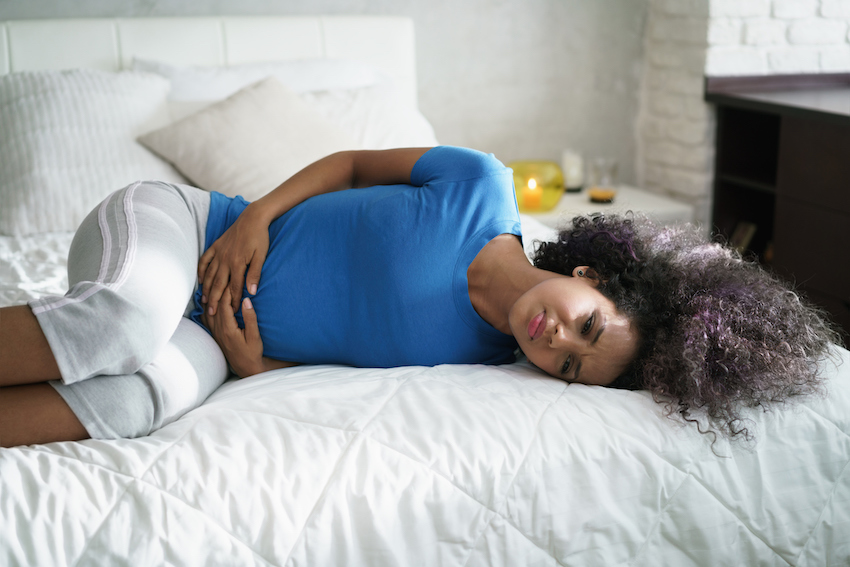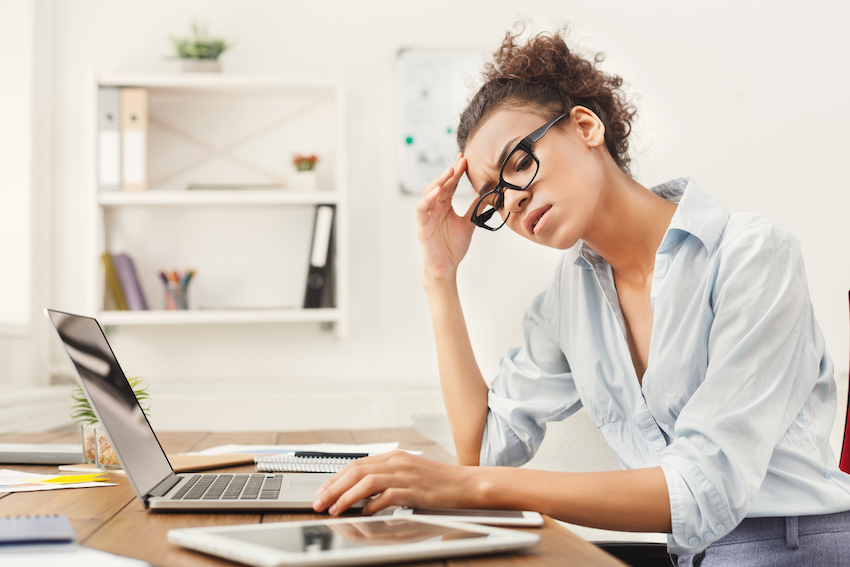
Periods are the worst, and they can absolutely affect your ability to work. Anyone who actually listens to women with periods should know this already. But in case you had any doubt, there's now a scientific study on the subject.
Researchers surveyed over 32,000 women in the Netherlands in 2017. They found that one in seven women, or 14% of the women, had to take off work or school during their periods. Moreover, 81% of the women said they'd been less productive because of period pain and other menstrual symptoms.
"Women said that they weren’t as productive as they could be while at work — they needed to go to the toilet every hour or they had a headache and couldn’t concentrate," explained Theodoor Nieboer, an author of the study and a gynecologist at the Radboud University Medical Center, according to CNN.
In total, this productivity loss added up to 8.9 days per year.
Maybe employers should start adding "period leave" to their benefit packages?!

Women are really excellent at hiding their menstrual symptoms (because society forces us to).
But ask anyone who's ever menstruated, and they'll tell you: It SUCKS to have to work during your period.

Between bloating and cramps and fatigue and headaches and, you know, constantly bleeding all the time, it can get incredibly hard to focus on work.
If you're "lucky," you might be able to take off during the worst days of your period. If not, you have to tough it out and show up even if you know you're not performing at your best.
Researchers in the Netherlands studied 32,748 Dutch women between the ages of 15 and 45 for three months. They wanted to explore how much period symptoms lead to "lost productivity," which they define as time off from work/school and working while feeling awful.
The researchers discovered exactly what women already know: In more cases than not, periods absolutely result in a loss of productivity.
Some numbers from the study: 3.5% of those surveyed said that it was a common occurrence for them to take off work for every period.

And 14% of women have taken time off from work or school at some point during their period.
The researchers concluded that women missed work or school an average of 1.3 days per year due to their period.
Also, women under the age of 21 were three times more likely to say that they'd taken time off because of their menstrual symptoms.
Not only do many women miss work because of their periods, but they can't even be transparent with their bosses about why they're not coming in.
Only one in five women in the study told their employers the real reason for their absence.
That's not very surprising. Periods (1) are a taboo topic and (2) often aren't considered a valid illness.
Even when women have enough sick days to cover the most miserable days of their period (which many women absolutely don't), they often tough it out and show up to work anyway.
A whopping 81% of women in the study said they were less productive at work due to period symptoms.

Productivity loss was equal to 8.9 days per year, and most of that was attributable to women who came to work during their periods.
Clearly, this is a problem. So what's the solution?
Well, 68% of respondents said they wished they had the option of more flexible hours during their periods.

I mean, working from home with the ability to freely go to the bathroom as often as you need, snack, randomly cry, and slap a heating pad onto your belly while you work? Sounds a lot better than heading into work with a briefcase full of tampons.
The ability to take time off work altogether, without lying or experiencing repercussions, would be even better. A "period leave," if you will.
That may seem like a pipe dream to women in the US, who are lucky if they even get enough regular sick days to cover the year. But period leave is a thing in several Asian countries, CNN reports.

Unfortunately, given how reluctant many people are to talk openly about their periods, it seems like we're a long way off from actually addressing the impact of periods on the workplace in the West.
"Despite being almost two decades into the 21st century, discussions about [symptoms] may still be rather taboo," study author Theodore Nieboer explained, per CNN. "There's a need for greater openness about the impact of menstrual symptoms on work, and companies need to be more open about this with their female workers."

Theodore added that he did fear that employers would use the results from the survey to discriminate against women employees. But he says that's emphatically NOT the right takeaway from their findings.
Instead, it's that menstrual cycles have an underappreciated impact on women's ability to work. They ARE "that bad" for a lot of people, and it would better serve women and their employers if we could be more honest about that reality and find ways to address it.




